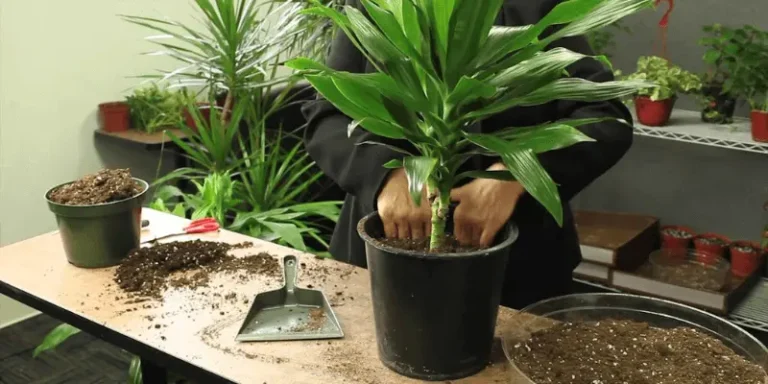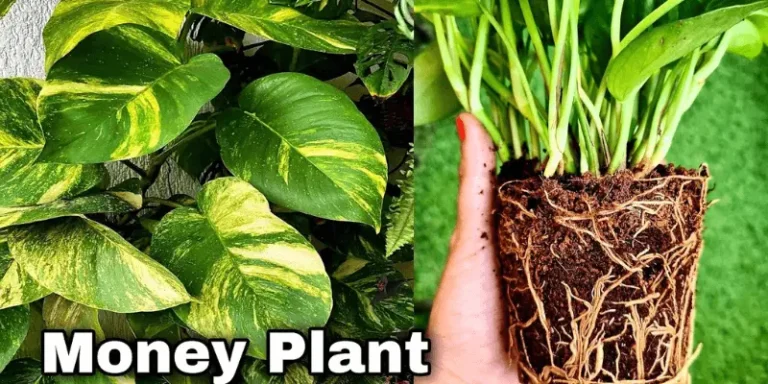“Herbs Indoor Gardening for Wellness: Health Benefits and Tips”
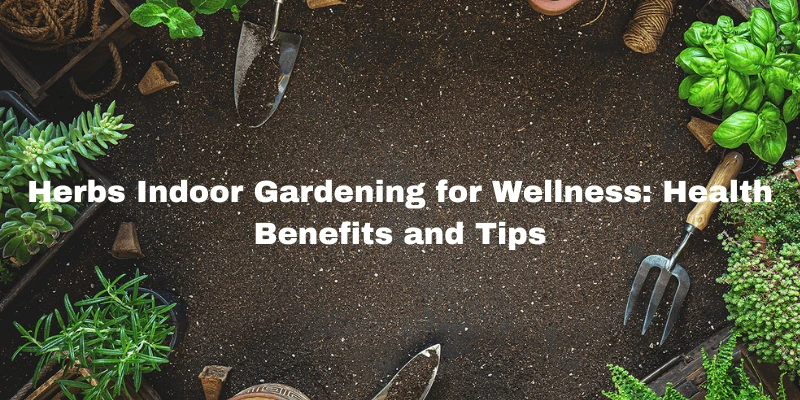
Indoor herb gardening has emerged as a popular and rewarding endeavor, which not only offers a touch of natural beauty within the confines of your home, but also offers many health benefits that significantly improve your overall health. In a world where our lives are increasingly dominated by technology and the demands of a fast-paced lifestyle, creating a calm and health-conscious environment is of utmost importance. Indoor herb gardening provides a unique solution to this modern problem, combining the relaxing effects of nature with the practicality of indoor herbs.
This article will serve as your comprehensive guide to the world of indoor herb gardening, taking you on a journey to healthy, lush greenery that can be grown right in your living space. . We’ll explore the fascinating array of health benefits that come with nurturing these aromatic plants, study the art of choosing the right herbs for indoor cultivation, and guide you through the setup of your indoor herb garden, will provide valuable insights into maintenance and creative ideas. . From improving air quality and reducing stress to enriching your dining experiences, indoor herb gardening offers a holistic approach to enhancing your quality of life.
Join us as we embark on this green adventure, where we’ll not only discover the secrets of growing an indoor herb garden, but also uncover the profound ways in which these herbs provide physical and Can promote mental health. So, grab your gardening tools and let’s plant the seeds of wellness with “Herb Indoor Gardening for Health: Health Benefits and Tips”.
Choosing the Right Herbs for Indoor Gardening:
When it comes to indoor gardening, one of the most important initial decisions you’ll need to make is choosing the right herbs to grow in your indoor environment. Much of the success of your indoor garden depends on choosing herbs that not only thrive indoors, but also meet your specific needs, be they culinary, medicinal, or simply aesthetic. Let’s take a closer look at this topic to help you make an informed choice.
A selection of herbs that grow indoors:
Herbs Adapted to Indoor Conditions: Not all herbs are suitable for indoor cultivation. Some herbs have a natural affinity for indoor environments due to their adaptation to low light levels, controlled temperatures and confined space. Examples of such herbs include basil, mint, oregano, and chives. These herbs thrive when grown indoors, making them a great choice for beginners.
Consider Your Growing Space: Assess the space you have available for your indoor garden. If you have a small window or limited counter space, then choose thyme, rosemary, or parsley that can grow in small containers. For those with more space, you can look for bay laurel or lemongrass.
Popular Indoor Herbs:
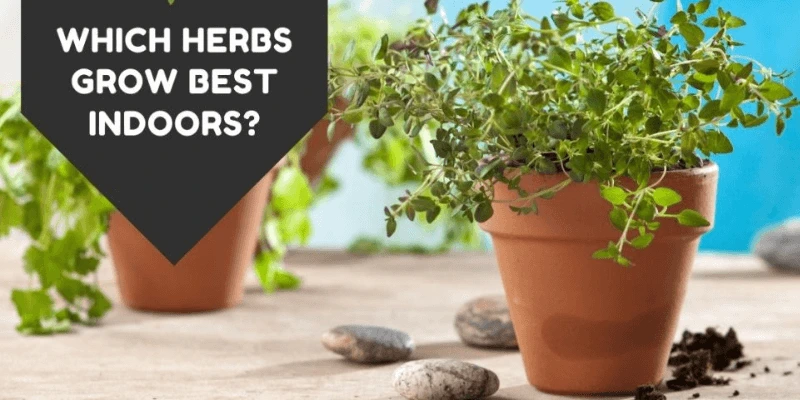
Now, let’s take a closer look at some popular herbs that are suitable for indoor gardening:
Basil: This fragrant herb is a favorite among indoor gardeners. It needs moderate sunlight and well-drained soil. Fresh basil leaves are great for adding flavor to various dishes.
Mint: Mint varieties, such as peppermint and spearmint, are great choices for indoor gardening. They thrive in partial shade and can be used to make refreshing tea or garnish desserts.
Chives: Chives are known for their mild onion flavor and are easy to grow indoors. They prefer bright but indirect sunlight and can be harvested for salads and garnishes.
Parsley: Both curly-leaf and flat-leaf parsley varieties adapt well to indoor conditions. They require moderate light and add a vibrant touch to your culinary creations.
Thyme: Thyme is a hardy herb that can withstand indoor conditions with good sunlight and well-drained soil. It is a versatile herb used in a variety of dishes from stews to roasts.
Rosemary: Although rosemary can grow quite a plant, it’s a great choice if you have plenty of space and sunlight. Its aromatic, needle-like leaves are fantastic for roasting vegetables and cooking meats.
Oregano: Oregano is another herb that is relatively low-maintenance indoors. It thrives in well-drained soil and bright light, lending a sharp flavor to Italian and Mediterranean dishes.
Lavender: Lavender is a great choice if you want to fill your indoor space with a calming scent. It needs plenty of sunlight and well-drained soil and can be used for tea and tea.
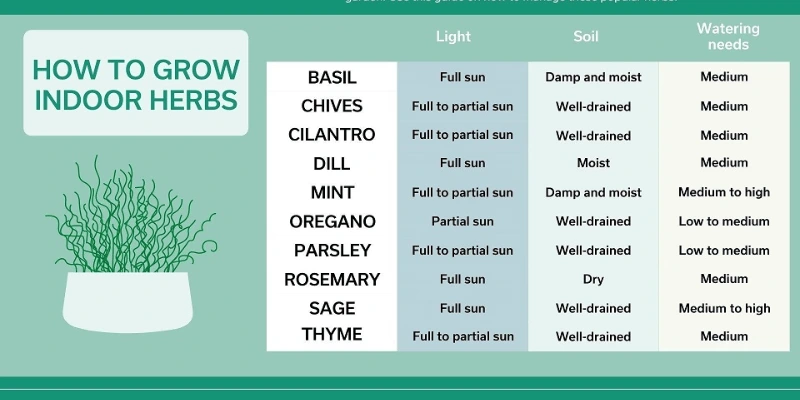
Health Benefits of Indoor Herb Gardening:
Indoor herb gardening isn’t just about cultivating a lush, fragrant corner of your home. It is also a gateway to many health benefits that can positively impact your physical and mental well-being. Let’s explore how growing herbs indoors can contribute to your overall health.
Improved air quality:
A significant benefit of having indoor herbs is their ability to improve the quality of the air you breathe. Many herbs, including basil, lavender, and mint, have natural air-purifying properties. They absorb common indoor pollutants, such as formaldehyde and benzene, helping to detoxify your living space. This clean air can cause:
Better respiratory health: Reducing indoor air pollution can reduce respiratory problems, making it easier for people with allergies or asthma to breathe.
Better sleep: Better air quality can promote better sleep, as fresh, clean air is conducive to a better night’s rest.
Stress reduction:
The process of tending to your indoor herb garden can be an incredibly therapeutic and stress-relieving activity. Gardening, even on a small scale, can:
Lower stress hormones: Engaging with plants and soil can stimulate the release of serotonin, a mood-enhancing neurotransmitter, and reduce levels of stress hormones like cortisol.
Boost Mood: The presence of greenery indoors is associated with improved mood and reduced anxiety and depression.
Pure and Medicinal Uses:
Indoor herbs offer a double benefit when it comes to your health. They can be used in your culinary endeavors and for their potential medicinal properties:
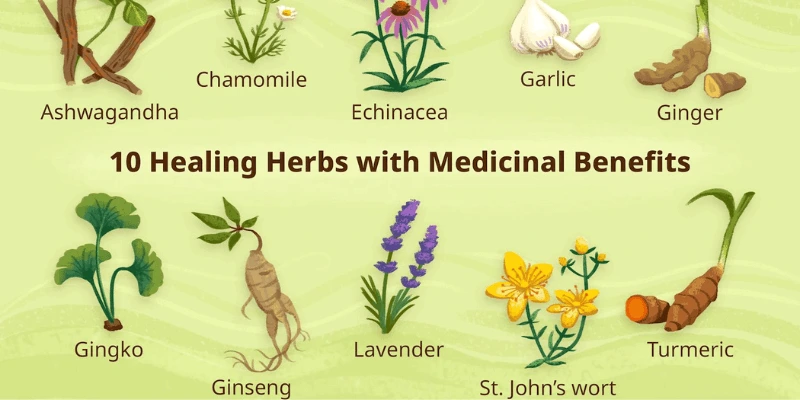
Flavorful and Nutritious: Freshly harvested herbs infuse your dishes with vibrant flavors while providing essential nutrients. Herbs like basil, thyme and rosemary add depth and richness to your culinary creations.
Medicinal Uses: Many herbs have been used for centuries for their medicinal properties. For example, peppermint can relieve digestive discomfort, while chamomile can help with relaxation and sleep.
Aromatherapy:
The aromatic properties of many indoor herbs make them a valuable addition to your home environment:
Aromatic environment: Herbs like lavender, rosemary and eucalyptus can fill your indoor space with pleasant aromas that promote a sense of relaxation and well-being.
Aromatherapy Effects: Inhaling the scent of certain herbs can have calming, uplifting, or clarifying effects on your mood and state of mind.
Creative Herb Garden Ideas:
Indoor herb gardening isn’t limited to traditional potted plants on your windowsill. There are many creative ways to grow and display your herbs, adding ease and style to your living space. Let’s explore some imaginative herb gardens that can transform your indoor environment into a vibrant and functional oasis.
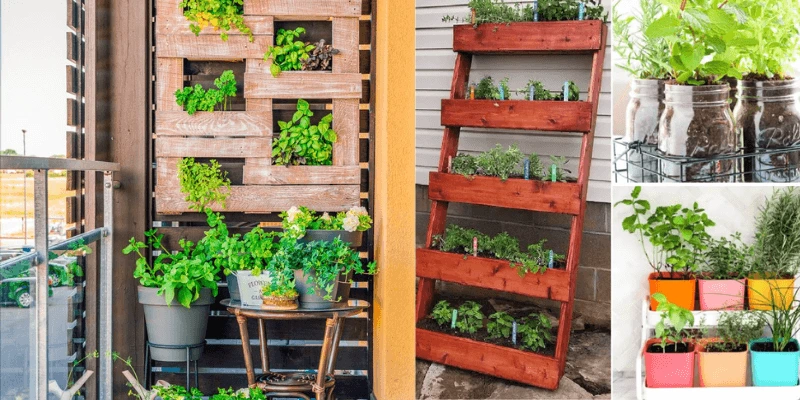
Vertical Gardens:
Vertical gardens are a great solution for those with limited floor space. Use your wall space to create a tapestry of living herbs. You can repurpose wall planters, pocket planters, or even pallets into vertical herb gardens. It not only maximizes space but also adds a unique visual element to your home.
Kitchen Herb Garden:
Bring your indoor herb garden into the heart of your home—the kitchen. Consider placing a dedicated herb shelf or rack near your cooking area. It provides easy access to fresh herbs as you prepare food, infusing your dishes with delightful flavors and aromas.
Windowsill Gardens:
Windowsill gardens are classic and charming. Arrange your herbs in a row of decorative pots or use a tall planter box that fits nicely on your windowsill. This not only looks aesthetically pleasing but also ensures that your herbs get enough sunlight.
Hanging Herb Garden:
Hang your herb garden from the ceiling using decorative hanging planters or macrame hangers. This creative approach adds an element of whimsy to your indoor space while keeping your herbs within reach.
Terrarium Herb Gardens:
Turn a glass terrarium into a miniature herb ecosystem. This enclosed environment creates a microclimate that requires minimal maintenance. It’s a visually appealing way to display your herbs and makes for an interesting conversation piece.
Herb Stair Garden:
Repurpose a wooden ladder by placing potted herbs on its rungs. This ladder garden not only adds a rustic touch to your decor, but also allows you to adjust the height of your herbs to accommodate their growth.
Herb Wall Art:
Combine art and functionality by creating a living herb wall. Arrange your herbs in a visually appealing way, using framed trellises or a grid of small shelves. This living wall art not only adds greenery to your space but also serves as a unique focal point.
Mason Jar Herb Garden:
Mason jars are versatile containers for your indoor herbs. Attach them to a wooden board or use wall hooks to display your herbs in a row of hanging jars. This is a simple yet attractive way to display your herbs.
Herb Garden Cart:
Repurpose a vintage bar cart or rolling utility cart into a mobile herb garden. This allows you to create a stylish herb station for your herbs to follow the sunlight or for entertaining.
Tea Box Herb Garden:
Turn an old wooden tea box into an herb planter. Compartments provide a visually pleasing way to organize different herbs and keep them within easy reach when making herbal teas.
Incorporating these creative herb garden ideas not only elevates the aesthetics of your indoor space, but also adds practicality and innovation to your herb growing endeavors. Explore these options to find the perfect style that fits your home and lifestyle.
Enhancing Your Well-being with Indoor Herbs:
Indoor herb gardening isn’t just about growing greenery. It is a wellness trip that can significantly enhance your physical and mental well-being. Let’s explore how these indoor herbs can contribute to your overall sense of well-being and improve your daily life.
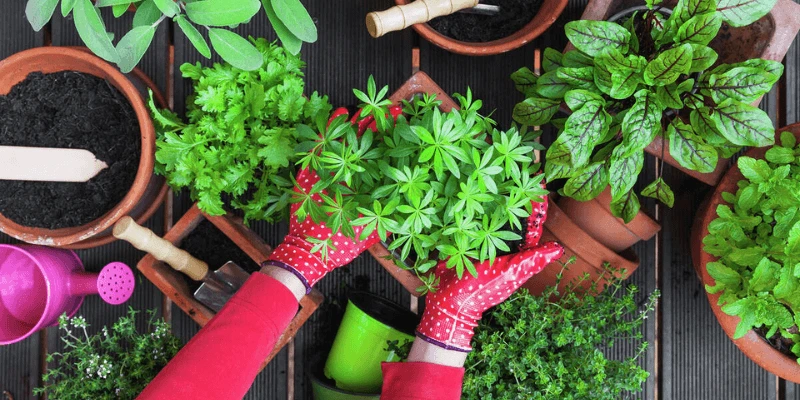
Aromatherapy:
Indoor herbs are nature’s fragrant treasure. Their fragrant leaves and flowers can be used to create a soothing and revitalizing atmosphere in your home.
Calming aromas: Herbs like lavender, chamomile and rosemary emit calming aromas that relieve stress, anxiety and promote relaxation. Place a few sprigs in a vase or use essential oils derived from these herbs to reap their aromatic benefits.
Energizing aromas: On the other hand, herbs like peppermint and eucalyptus can stimulate your senses and boost energy levels. Inhaling these herbs can help improve alertness and focus.
Herbal Tea:
Growing your own herbs opens the door to an endless variety of herbal teas, each with their own unique flavor and potential health benefits.
Relaxation and sleep: Herbs such as chamomile and valerian root can be infused in tea at bedtime, promoting relaxation and a restful night’s sleep.
Digestive health: Peppermint and ginger can aid digestion, relieving indigestion and bloating when consumed in a soothing tea.
Boosting immunity: Elderberry, echinacea and thyme are known for their immune-boosting properties, making them ideal for teas during cold and flu season.
Smart Gardening:
Tending to your inner herb garden can be a form of mindfulness meditation. Nurturing these plants, tending to their needs and watching them grow can provide a sense of calm and connection to nature.
Stress reduction: Gardening has been shown to reduce stress levels and promote a sense of calm. The rhythmic tasks of watering, mowing, and harvesting can be meditative.
Mindful Presence: Focusing on the present moment while gardening allows you to disconnect from the digital world and find comfort in the simplicity of living plant care.
Connection with nature:
In an increasingly urbanized world, indoor herb gardening provides a solid connection to the natural world.
Biophilic benefits: Biophilic design principles suggest that human well-being is enhanced when connected to nature. Indoor herbs bring nature indoors, improving your living environment.
Seasonal Awareness: Gardening also connects you with the changing seasons. Observing the growth and life cycle of your plants can foster a deeper appreciation for the natural world.
Food Delights:
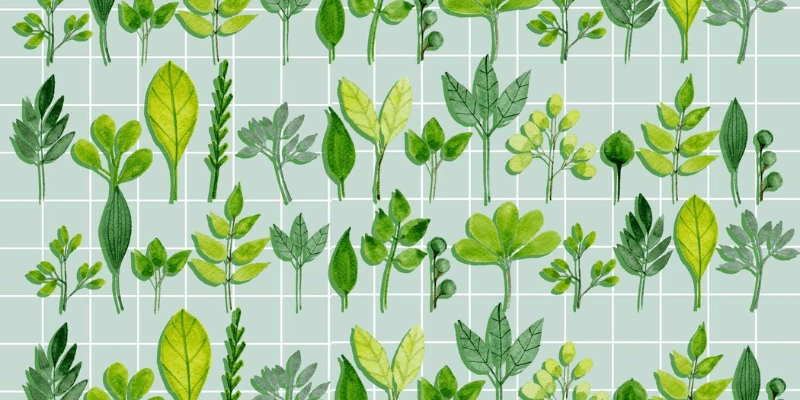
In the end, the most practical benefit of indoor herbs is the culinary delight they bring to your meals.
Fresh flavors: Herbs like basil, parsley and cilantro can elevate your dishes with fresh, aromatic flavors that store-bought herbs can’t easily match.
Healthy eating: Using herbs in your cooking can encourage healthy eating habits by making vegetables and lean protein more appealing.
Incorporating indoor herbs into your daily life isn’t just about aesthetics or culinary convenience. It is a holistic approach to wellness. From aromatherapy to herbal teas, mindfulness, and an intimate connection with nature, indoor herbs offer a multifaceted approach to enhancing your quality of life from the inside out.
Incorporating indoor herb gardening into your life not only brings nature indoors, but also boosts your physical and mental well-being. From improving air quality to reducing stress and enhancing your dining experiences, herbs have the power to transform your living space. Embrace the world of indoor herb gardening and enjoy the multifaceted benefits it offers.

